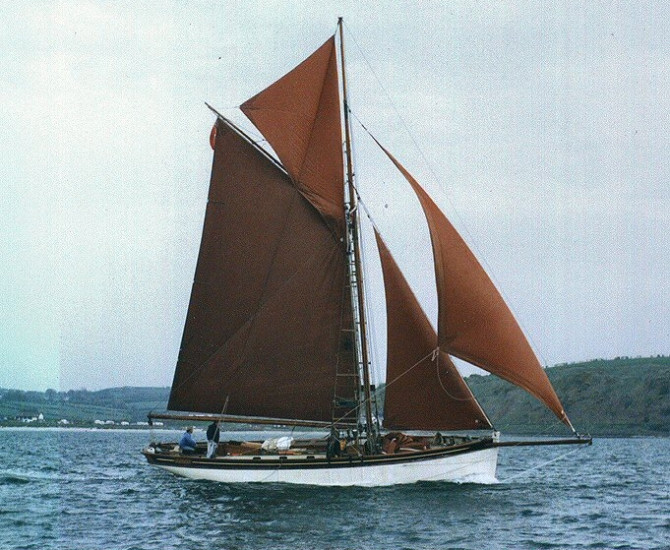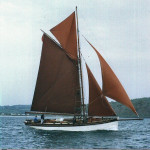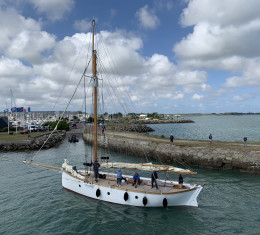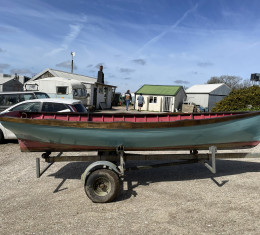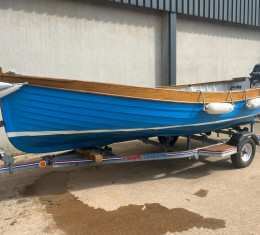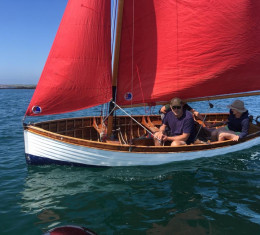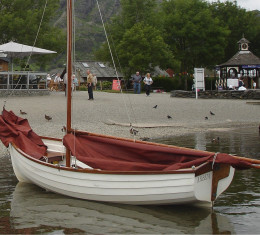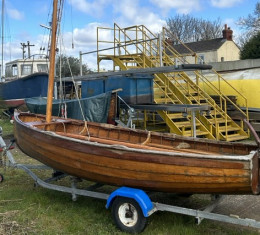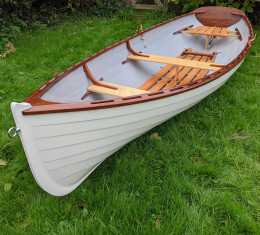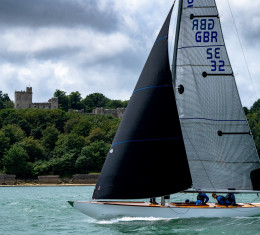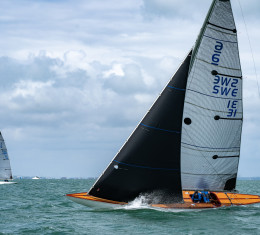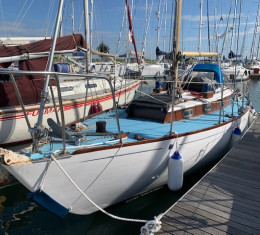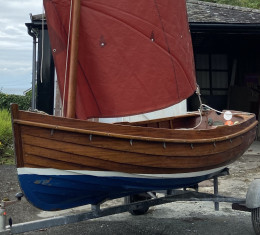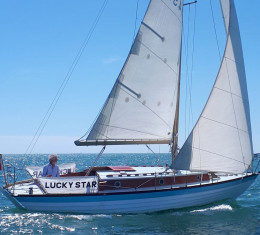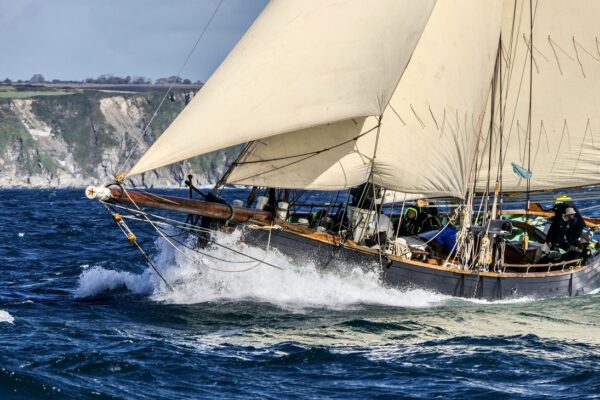Sailing yachts
Full specification
Wooden ships comments on this Bristol Channel Pilot Cutter UK Flag
Wooden Ships is proud to offer for sale the only unrebuilt original Bristol Channel Pilot Cutter, still in regular commission and sailing blue waters after an amazing 135 years.
Every port around the country had it’s pilots to bring the big ships safely into harbour, the pilots had their own cutters as indeed they do today but the Pilot Cutters of the Bristol Channel have earned a reputation close to mythology.
In most ports, the pilots used what was most convenient and cheap – a local fishing boat or even a rowing boat in many cases
Bristol was a major shipping port up to the middle of last century and after weeks at sea, shipping approaching up the tricky waters of Bristol Channel had need of skilled pilots with expert local knowledge.
The pilots were in competition with each other as they ranged far out to the Western Approaches in search of incoming ships. A successful pilot with a fast cutter or skiff as they called their boats could earn a lot of money and many became wealthy men.
Speed was of the essence as they raced for a prize, the pilot was rowed over in a small boat and climbed the Jacob’s Ladder while his skiff stood off either to follow him home or to put another pilot on another incoming ship.
There are now only 10 of the original skiffs left sailing, all beautifully restored, some totally rebuilt with only a vestigial part left for authenticity.
In the last few years with the growing interest in these boats, several more have been built on the lines of the originals.
In addition, there are many more pilot cutter-inspired boats built in the last few years.
However this one is the only remaining example of the breed which has not had a serious rebuild and remains in excellent condition with no loss of shape or distortion, still sailing regularly with recent blue water voyages under her keel to prove her quality.
Built by Davies and Plain, Cardiff in 1875 as a working pilot cutter and remained in service until sold and converted for leisure sailing shortly before the War in the late 1930’s.
Now 20 years in only her 8th ownership with 40 years in the previous same ownership.
The little cutter has survived in amazing condition, a tribute to her builders and all her 8 owners.
To prove her viability and disprove any age discrimination, her cruising in present ownership is:
1993/4 Refit on purchase (see below for more details) Voyage round Ireland
1995 N Spain, Galicia, Brittany.
1996 Brest Douarnenez and the Scillies
1997 Channel Islands, Brittany, Scillies
1998 West Coast of Greenland, via Iceland
1999 Cornwall and Brittany
2000 – 2005 Mediterreran. Almerimar, Morocco, Palma, Alicante
2006 – 2007 Azores Lorient
2008 – 2010 West Coast Scotland
2011 Brittany
2012 N Spain
Construction.
Classic pilot cutter lines with a straight stem, long keel with slight drag and elliptical counter stern.
Planked in pitch pine and fastened with galvanised boat nails to relatively light oak frames, approx 3” x 4” at 14” centres in pairs of sawn and grown futtocks.
Long oak keel.
All internal ballast. In present ownership the original iron pig ballast was removed and replaced in the same weight in lead making for a cleaner bilge.
In the winter of 1996/97 the stem was replaced, forward dead-woods replaced, knightsheads replaced, the hull extensively refastened and recaulked.
The deck is straight laid in quarter-sawn pine, caulked and payed. This deck was laid in Portsmouth for the previous ownership by Michael Parvin around 1980.
Varnished mahogany coverboards. Wide mahogany king plank.
The seams were all repayed in butyl rubber compound in 2009.
The strength of this hull comes from a 4” thick coverboard rebated into the ends of the deck beams and through fastened down through the beam and the beam shelf which probably explains why the hull has kept it’s shape and sheer.
On the inside, most of the deck beams have been reinforced at some time in the past, probably in the previous 40 year ownership, by steel angle on the after faces of the full width beams and carried round the beamshelf with steel hanging knees and approx 2’ down the ship’s sides, all in excellent condition.
Bulwarks all round on oak stanchion posts, separate from the frame heads.
Varnished laminated mahogany capping rail.
Shallow coach-roof standing some 9” off the deck from cock-pit to the mast with painted teak coamings set with oval bronze port holes.
The coach-roof deck recovered in canvas in 1993.
Traditional varnished sky-light.
Typical small, deep pilot cutter cock-pit with varnished teak coamings standing 12” off the deck, rounded aft with low seat lockers each side. Ply sole panels all lift to give full access to the bilge and shaft gland below.
Stbd off-set entrance hatch on the coach-roof gives access to the cabin. All varnished teak hatch with sliding top and twin full length doors down to a 4” step.
Varnished timber pillar in the middle of the cock-pit carries a traditional polished copper life-boat type compass binnacle.
The Pilot Cutter was originally steered with a tiller sweeping between the traditional Sampson posts in the after corners of the cock-pit.
Steering now by wheel on a double screw thread to the rudder head with varnished box over. New rudder 2013.
Fuel tank filler and vent under the box.
Narrow, varnished teak fore hatch on the fore deck, off-set to port.
Stbd off-set bitts carry the heel of the bowsprit running out alongside the stbd side of the stem post.
A modern Lofrans 12v windlass on the port side of the deck forward fitted with chain gipsy and warping drum.
A traditional goose-neck vent forward against the stem ventilates the fore peak below and conveniently takes the anchor warp to the locker below.
Plough and Fisherman anchors stowed on the fore deck.
The vessel has excellent clear deck space, plenty of room to move around and work the rig, useful fair weather seating on the coach-roof and the small deep cock-pit is very secure in heavy weather.
Rig
Gaff cutter rig on an oiled spruce mast stepped through the deck onto the keel with a fidded topmast. The mast has a square section where it penetrates the deck. Spars all newly varnished 2013
The vessel was re-rigged prior to the Greenland voyage in 1998 with new galvanised rigging wire, new boom, gaff, topmast and bowsprit.
Twin galvanised wire lower shrouds each side set up with dead-eyes and lanyards to external iron chain plates. The after shroud is set well aft to act as a standing back-stay typical of the pilot cutter rig thus avoiding the necessity of running backstays.
Stainless steel cap shrouds each side set up with lanyards to a middle chain plate, one to the lower mast cap and one to the topmast cap.
Running back-stays on tackles to the topmast cap set up with light-weight cord “fuses” and tackles reached from the helm..
Galvanised wire stemhead forestay to above the hounds, set up to a rigging screw on the stemhead.
This fore stay takes the hanked and boomed staysail.
Varnished staysail boom on a pivot just aft of the stem and sheeted to a galvanised horse on the deck in front of the mast.
Outer fore stay from the end of the bowsprit to the topmast truck.
Jib on a Wickham Martin roller furling gear to the top of the lower mast, set on a traveller hauled out to the end of the bowsprit.
Varnished pine main boom with original Appledore roller furling mechanism mounted on double mast bands, fool-proof, reliable and easily used. The boom was replaced recently.
The boom sheets to a traditional shock absorbing horse on the aft deck.
Varnished pine gaff with original leathered saddle. Mainsail lacing.
Belay pins on the lower mast band and cavil bars on the bulwarks take all the falls.
Sails. New sails in 1993
Mainsail in red terylene, new in 2006
Staysail, overhauled 2006
Large Jib, overhauled 2006
Small jib
Topsail
Winches.
Pair of bronze, bottom action sheet winches with self tailing “horns” mounted on the cock-pit coamings take the jib sheets.
Halyards on block and tackle
Machinery.
Perkins M90 80hp 4-cylinder naturally aspirated, fresh water cooled diesel engine on the centre-line below the cabin entrance step, fitted new in 1999
2006 single lever controls PRM gearbox with conventional centre-line shaft drive to 3-blade prop.
New shaft, cutlass bearing and stern gland in 2013. Engine and gearbox removed, painted and refitted. The bilge below has been cleaned and painted.
Fuel
44 gall steel tank aft replaced in present ownership.
33 gall tank under the stbd fwd berth.
Water
90 gall s/s tank under the forward double berth
Electrics.
1 x 12v engine start battery
2 x 12v 150 amp/hr domestic batteries on 12v circuits.
12v engine driven alternator.
Intelligent battery management system.
Shore power connection
Battery charger
12v/240v inverter
Accommodation. 9 berths
On purchase in 1993, the interior joinery was all removed to gain access to the hull to check and clean. The interior was then rebuilt with the present very practical lay-out – a forward sleeping cabin and a large saloon cabin with pilot berths behind the settees and a quarter berth.
The joinery is constructed in varnished T&G pine bulkheads trimmed with mahogany, mahogany bunk boards, grab rails and posts, saloon table and cabin sole boards.
The hull interior behind the berths is lined with light T&G pine boarding
From forward, fore peak with the bitts, chain locker. Plenty of space here for coils of cordage hung each side, the outboard engine secured to the bitts etc.
Bulkhead opening to the forward sleeping cabin. Double berth to port, single berth to stbd.
Wide shelf over the double berth was a further single berth but found to be more useful when raised to form a storage shelf.
Quaint bedside table alongside the double berth for the skipper’s slippers and morning tea.
Single berth to stbd with a stowage recess against the ship’s side. 33 gall diesel tank under the berth.
Pipe cot suspended above, folds up against the deckhead.
Water tank under the double berth.
Narrow open tread ladder to the teak fore hatch above.
Exposed under deck and deck beams.
Stbd side bulkhead opening with vertical grab posts each side to stbd work-bench and port heads compartment.
The work bench is exceptionally useful, very heavy timber surface with a vice, shelves above, locker and 3 drawers below keeps all the tools together in the right place.
Opposite to port is a large heads compartment with the door on the angle. Jabsco sea toilet with a removeable varnished mahogany seat and lockers under the side deck up behind, porcelain hand basin against the fwd bulkhead, teak gratings over a s/s shower tray.
12v pump to evacuate the waste water.
H&C at the hand basin.
Black water holding tank in the cupboard above the heads has never been used. Readily accessed change-over valves behind the Jabsco.
Saloon cabin with port and stbd settee berths and pilot berths up behind each side.
The after ends of both pilot berths extend behind the chart desk to port and the galley to stbd to give a useful stowage corner for bedding etc.
Reflex diesel fired cabin heater in a recess forward to port of the mast.
Fine varnished double drop leaf table with stowage recess
Chart desk aft to port, galley aft opposite to stbd
High level chart desk used standing facing outboard takes a half size Admiralty chart.
Bookself above for pilot books etc.
Electrical switch panel on the after bulkhead.
Intelligent fridge under the chart desk.
Galley down the stbd side with smart Plastimo Neptune 3000 s/s gimballed 3-burner, grill and oven gas cooker in a stainless steel lined recess, vertical grab rails either side.
Gas bottles stowed on deck by the mast.
Pilot gas sensor solenoid safety control
Next aft is the stainless steel sink in a work surface, cupboards and drawers under, shelves up behind under the side deck.
Mixer tap with pressurised H&C.
Foot pump cold water tap
Bronze salt water tap, currently disconnected.
The sink waste is pumped overboard by a 12v pump with change-over valves under the sink to pump the shower waste.
Wet locker in the after stbd corner with hanging rail and recess for gumboats, conveniently right alongside the cabin entrance so no excuse for wet clothing in the cabin.
Engine under a centre-line box with steps down the stbd side against the wet locker.
Quarter berth to port, aft of the chart desk. Shelf above, batteries and tool stowage under.
Lid over the recess between the quarter berth and the engine box covers the readily accessed fuel filters.
Wide, varnished engine box lid with non-slip foot prints.
Head-room
Saloon cabin 6’4” under beams
Forward cabin 5’4” under beams
Bunk lengths 6’6”
Equipment.
Navigaton
Binnacle compass
Chartplotter
Cobras VHF DSC
Garmin 550 Map
2013 log and sounder
Furuno weather fax
Lead line
Deck
2 manual bilge pumps
Engine driven Jabsco bilge/deck wash
Inflatable dinghy with inflatable floor, pump and oars.
Suzuki outboard engine.
Warps and fenders
Domestic
12v Isotherm intelligent fridge
Fusion radio received takes Ipod 2 speakers in the cabin, 2 speakers in the cock-pit.
Crockery, cutlery etc
Ground tackle
35lb CQR anchor
Very long multiplat warp
55lb Fisherman anchor
180’ chain
Lofrans 12v windlass
Safety
Firdell radar reflector
Weatherfax
8-man RFD life-raft, newly serviced 2012
Flares
Other
Engine spares
Rig spares
Specific exclusions
Life jackets and harnesses.
Tools
Charts and pilot books.
Disclaimer:
These particulars have been prepared in good faith from information provided by the Vendors and are intended as a guide, Wooden Ships cannot guarantee or warrant the accuracy of this information nor warrant the condition of the vessel. The Purchaser should instruct his agent or surveyor to validate all details as necessary and satisfy himself with the condition of the vessel and its equipment.
Wooden Ships classic yachts brokers have an extensive database of boats for sale. With a wide range of sailboats, classic yachts, motor yachts and small classic boats, Wooden Ships has one of the largest selections of traditional wooden boats and yachts for sale in the UK.
Disclaimer:
These particulars have been prepared in good faith from information provided by the Vendors and are intended as a guide, Wooden Ships cannot guarantee or warrant the accuracy of this information nor warrant the condition of the vessel. The Purchaser should instruct his agent or surveyor to validate all details as necessary and satisfy himself with the condition of the vessel and its equipment.

